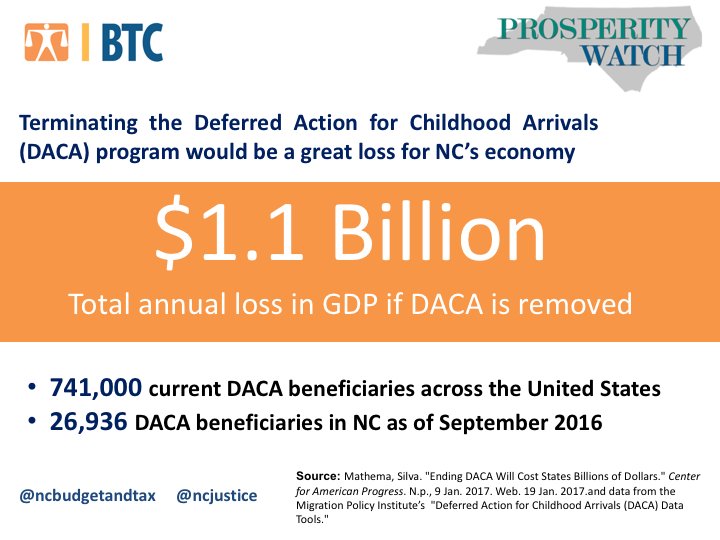Prosperity Watch (Issue 69, No. 3)
Jan. 23, 2017
The incoming political administration is strongly considering ending the Deferred Action for Childhood Arrivals (DACA) program.
The DACA program provides a renewable two-year reprieve from deportation and work authorization to immigrants who were brought to the United States as children. In North Carolina, DACA beneficiaries are also able to obtain a state driver’s license. A new estimate by the Center for American Progress revealed that the repeal of DACA would cost the country about $433.4 billion in GDP over 10 years. In North Carolina, the loss of DACA would remove thousands of workers from the labor force, amounting to an annual GDP loss of $1.1 billion. Additionally, experts predict that in the next decade, immigrants and their children will comprise the only increase in our labor force population. What this means is that the protection of opportunities for immigrant youth is not only the right thing to do, it is also the necessary thing to help our state thrive economically.
Since its inception, more than 741,000 immigrant youth across the country have been able to achieve better opportunities through the DACA program. In North Carolina alone, there are 26,936 individuals currently participating in the program. Thousands of immigrant youth beneficiaries have obtained higher paying employment opportunities and pursued dreams in education thanks to this program. By taking advantage of these opportunities, DACA beneficiaries have also been able to offer economic relief to their families.
In the realm of higher education, DACA beneficiaries are still counted as out-of-state students in our state, and are expected to cover out-of-state tuition costs without having access to state and federal aid. With the help of family and community members, some of them have been able to meet this challenge and pursue degrees in higher education. Their personal successes and achievements are also wins for all North Carolinians who will benefit from their long-term contributions to our state.
For more on the economic consequences of excluding immigrants, see our previous Prosperity Watch on the cost of mass deportation for North Carolina.
 Justice Circle
Justice Circle 
